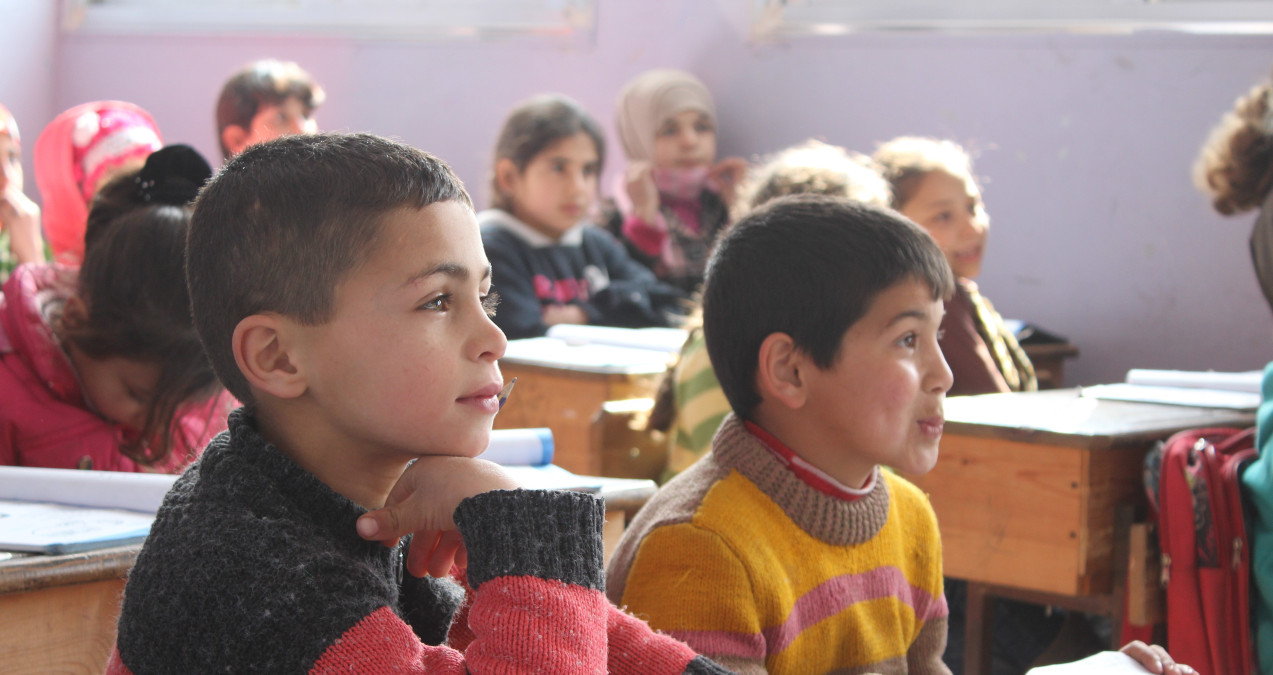Avoiding a “lost generation” in Syria
Published: Sep 12, 2019 Reading time: 5 minutes Share: Share an articleSince the start of the conflict in Syria, millions of children have grown up knowing only war, their education repeatedly interrupted by bombings, displacement, bereavement and injury. These missed years of schooling are putting the country at risk of a “lost generation”.

For nine-year-old Lujain, who lost her father in an airstrike, it was hard to begin school following his death. “I cannot write very well,” she told us, shyly. “I try to spell each word and break it down into letters to be able to read it.”
But since last October, the school in Lujain’s mountainous village in northern Idlib now has a special remedial class for children like her. With this extra support, she has begun to flourish.
“Lujain is learning well and quickly,” remedial teacher Fatima told us with a smile. “She will be back to her class soon.”
Fatima travels many kilometers to come to school each day, where she enjoys helping her students improve their writing and reading skills, using a special textbook supplied by People in Need. Similar classes have been launched at sixteen schools we work with across Aleppo and Idlib, specifically to help children who have missed out on a lot of schooling.
Lujain and Fatima’s school has been receiving support from People In Need as part of a new project funded by the European Neighbourhood Instrument (ENI) and Czech Republic Development Cooperation. Entitled “No Lost Generation in Syria,” the project provides a full package of support for schools, right through from repairing classrooms damaged by bombs and fighting, to providing desks and whiteboards and stationary for students.
Teachers are offered specialised training and incentives, while parents are encouraged to send their children to school through open days, and cash-for-work opportunities that provide them with an income in return for doing useful jobs in the school and community.
Especially in small villages, these linked interventions are having a noticeable impact. Children who did not previously have access to schools now do. Barriers to attending school, such as not being able to afford books and learning materials, have been removed.
Crucially, psychosocial support facilitators are also funded at all schools, where they play an important role in helping students to build their self-confidence and resilience through a range of structured activities. Arts and music sessions allow children the space to express themselves and relate better to others, and facilitators are trained to identify behaviours that point to a need for additional help.
Tamam, 35, is a facilitator at another school People In Need supports. Originally from a small village in Hama, Tamam knows firsthand what her students have been through, as she had to flee the fighting herself. “I lost my home, my work and everything,” she explains. “We had to start from scratch again.”
Over 600 students attend to Tamam’s school, the majority of them girls. “I treat them like my own children,” she smiles. Her role is to observe students’ behaviour, explore their problems and—little by little—help to overcome them. After many years of war, the challenge is not just for these children to return to school, but to be able to fully embrace learning and start thinking of their future.
“Once an airstrike hit very close to a young pupil’s home,” Tamam explains. “Her cousins were killed and her home damaged. She was greatly shocked, and became very introverted; she did not talk to anyone. I gave her special attention and I worked with her really hard, and thank God she has improved noticeably.”
Bereavement is unfortunately all too common among pupils in Syria. Last year, at least three children were killed every day in Syria and schools are currently being bombed by airstrikes and shelling. For those who survive, the help provided by facilitators like Tamam is a first step toward dealing with the trauma they have experienced.
And Tamam has been impressed by how determined many students are to continue their education, despite what they have been through. “The best thing in this support is the summer school,” she says. “Even in the summer, students come to school for catch-up and reinforcement lessons.”
Twelve-year-old Odai is an example of this kind of remarkable determination. He was living in Ariha city in Idlib, until the conflict intervened with devastating consequences. “While we were in the market, my brother was killed in an airstrike,” Odai told us. Odai’s own left hand and shoulder were broken. “I spent four months in the hospital having operations to cure my hand and extract shrapnel,” he explained. “I can use my right hand for writing and carrying things but I cannot use my left hand.”
Despite this disability, and the two years of school he missed as a result, Odai is determined to continue his education in the village his family has now fled to. “I love to go to school,” he says, “and I am insisting on being the top of my class. I would like to be an engineer in the future. I would like to plan how to build homes and bridges.”
With funding from the European Neighbourhood Instrument (ENI), Czech Republic Development Cooperation and other donors, People in Need currently reaches more than 13,000 students across Northern Syria, and support over 600 qualified teachers and PSS facilitators. Read more about this and the other forms of humanitarian assistance we provide here.
*The names of certain individuals living within northern Syria have been changed for protection purposes.









